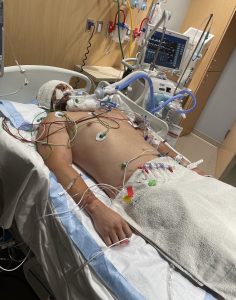- Slug: Sports-Jake Borup, 1,000 words.
- 3 photos available (thumbnails, captions below).
By Josh Amick
Cronkite News
PHOENIX – As the Arizona State baseball team awaits its postseason fate, memories turn to the last time the Sun Devils advanced to the College World Series in 2010.
That’s also the year Jake Borup played his final season for ASU before waiting to see which team would take him in MLB’s amateur draft.
These days, Borup is playing the waiting game again … for a new heart.
The former standout right-hander for the Sun Devils, who went on to play two seasons in the Philadelphia Phillies organization, suffered a life-threatening heart attack last year and is now in the prelimary stages of placement on a heart transplant waiting list.
“Friday morning on October 28, my wife and I were at the gym for about 30 minutes before we had to leave,” Borup, 36, said. “The minute I started working out, I began losing my breath and had to go to the locker room to sit down. I texted my wife saying this is getting worse and I need to get looked at, and around 9:30 we hopped in the truck, heading to the hospital.”
During that ride, Borup’s wife, Shea, would witness body convulsions, loss of consciousness, foaming from the mouth and her husband’s skin turning a bright red tomato-like color.
“His eyes rolled into the back of his head and he started having a seizure,” Shea said. “His body was convulsing, making weird noises like dry heaving and then his whole body just went stiff.”
These events would last for about two minutes before Borup came to, saying he felt much better and they no longer needed to go to the hospital.
His wife ignored him.
“You didn’t just witness what I did,” Shea said. “We are going.”
Within five minutes of arriving at the hospital, Borup was hooked up to an electrocardiogram machine to evaluate his heart rhythm. He had multiple wires coming out of him.
“I was looking at this doctor like, ‘What’s going on?’ And he’s like, ‘Dude, you’re having a massive heart attack.’ Then I passed out and I don’t remember anything for about 40, 45 days,” Borup said.
As one of Borup’s main heart vessels was dying, he was transported to Banner Heart Hospital in Mesa, where they issued a Code Blue, which for Borup was a medically induced coma.
It was a stunning reality for the 35-year-old father of six. Just 12 years earlier, he was a standout pitcher for ASU, finishing the season 11-1 with a 4.08 ERA and earning Honorable Mention All-Pac-10. His efforts caught the eye of the Phillies, who drafted him in the 23rd round.
Now here he was, fighting for his life on a hospital bed.
“When I was able to see Jake, he just looked like a dead person, hooked up to machines,” Shea said. “At that moment, hearing how bad his condition was, it was pretty hard on me. … My husband might not survive this.”
Borup was put on life support while doctors debated the next step in the procedure. The heart pump he had in place was not aiding in the healing process as they hoped it would.
“One day Dr. (Orazio) Amabile comes in and says, ‘This is it,’” Shea said. “He is not progressing on his own. We need to do the surgery now.”
The surgery required was an LVAD (left ventricle assist device) insertion that would be designed to help Borup’s heart beat on its own and restore normal blood flow.
“The doctor said there was a very high risk of Jake dying by doing this procedure,” Shea said. “But there was a 100% chance of him dying if we did nothing.”
The surgery worked.
“The right ventricle in his heart looked good enough and the LVAD was working,” Shea said. “I cried tears of joy.”
When the nursing staff removed Borup from the ventilator, he immediately recognized his wife, remembered his kids’ names and the reason for his hospitalization, but not much more.
“For that whole month he was having like a hallucinogenic dream,” Shea said. “He has a reality for him that was not the hospital’s reality.”
Once released from the hospital, Borup began a physical therapy program that incorporated the use of a walker as he retrained his body to walk again.
“One day, I finally just had enough energy where I was like, ‘Forget it, I am ditching the walker,’” Borup said. “I could walk 50 feet one week, 100 the next, until I was able to walk unassisted for probably four or five weeks. Now I am at the point where I feel comfortable enough to walk and live a normal life as far as my physical activity.”
Borup is in the evaluation process required to get listed for a heart transplant, where the goal is to be transplanted within a year of being on the list.
“After you receive the heart transplant, you have to be in the hospital every week and multiple times a month,” Borup said. “They have to make sure this new heart isn’t rejected by the rest of your body. It’s like your heart and body shake hands and make sure they’re cool with each other.”
A friend recently set up a GoFundMe page to assist the family with finances while they await a donor.
The ASU baseball team will learn Monday if it will be one of 64 teams competing in the 2023 NCAA college baseball championship.
Borup is trying to exercise patience, too, as he awaits the biggest save of his career.
For more stories from Cronkite News, visit cronkitenews.azpbs.org.


